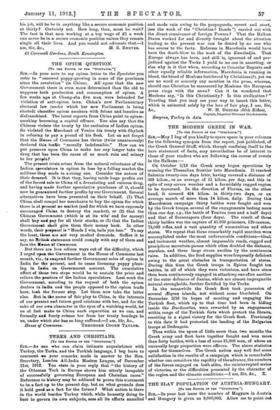THE OPIUM QUESTION.
[To THIC EDITOR OF THE "SPECTKTOR."1
Sin,—In your note to my opium letter to the Spectator you refer to "renewed poppy-growing in some of the provinces since the revolution" (in China). All agree that the new Government there is even more determined than the old to suppress both production and consumption of opium. A few weeks ago at Chang-sha five men were beheaded for violation of anti-opium laws. China's new Parliamentary electoral law (under which her new Parliament is being elected) classifies opium smokers with felons and lunatics as disfranchised. The latest reports from China point to opium. smoking becoming a capital offence. You also say that the Chinese violate the treaty by the exclusion of Indian opium. So violated the Merchant of Venice his treaty with Shylock in refusing to pay a pound of his flesh. Let us not forget that the House of Commons has thrice (twice unanimously) declared this traffic "morally indefensible." How can we put pressure upon China to make her any longer take the drug that has been the cause of so much ruin and misery to her people ?
The present crisis arises from the natural reluctance of the Indian speculators in opium to lose by a falling market the millions they made in a rising one. Consider the nature of their demand. It is that they, having made huge profits out of the forced sale to China of a devastating and ruinous drug, and having made further speculative purchases of it, should now be guaranteed further profits by out. Government. Several alternatives have been presented on their behalf. (1) That China shall compel her merchants to buy the opium for which there is at present no market (and for which we have expressly encouraged China to destroy the market), or (2) that the Chinese Government (which is at its wits' end for money) shall buy and pay for all their stocks, or (3) that the Indian Government shall give them their money back. In other words, their proposal is "Heads I win, tails you lose." To say the least, these are not very modest demands. Suffice it to say, no British statesman could comply with any of them and face the House of Commons.
But there are less odious ways out of the difficulty, which I urged upon the Government in the House of Commons last month, viz., to suspend further Government sales of opium in India for the present, and to cease licensing poppy plant- ing in India on Government account. The cumulative effect of these two steps would be to sustain the price and relieve the position of the Indian speculators. Last week the Government, acceding to the request of both the opium dealers in India and the people opposed to the opium trade here, took the former step. Let them now take the latter also. But in the name of fair play to China, in the interests of our present and future good relations with her, and for the sake of our own character in the eyes of a watching world, let us at last make to China such reparation as we can, and formally and freely release her from her treaty bondage to us, under which she has so long suffered.—I am, Sir, Stc., House of Commons. THEODORE COOSE TAYLOR.










































 Previous page
Previous page